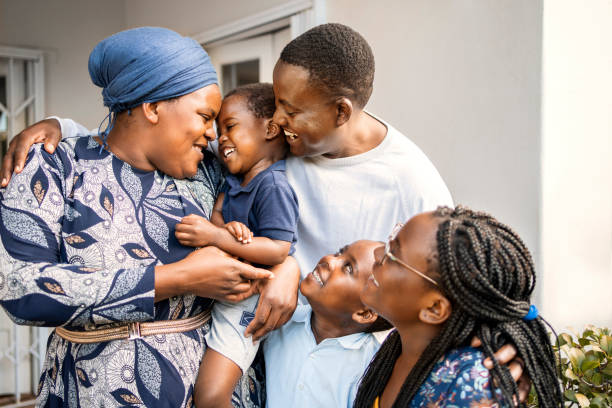Society
On the flip side

By Abimbola Ola
Sometimes I wonder if Oladele remembers that I gave him the most beautiful gift in September—a child, our child. Yet, instead of gratitude, I get shouts, insults, and threats.
At the slightest misunderstanding, his voice rises: “Fat body, you look like a pig! Are you the only one who just gave birth?” Those words pierce me every time, louder than any slap could ever feel.
I carried life for nine months, I endured pain, I bore sleepless nights, and my body is still healing. But all he sees is flesh that isn’t tight enough, a belly that hasn’t gone down, a body he suddenly despises. He tells me, “By December, if you don’t do something about your look, I will throw your things away.”
The same body he once held with love, the same body that gave him pleasure, the same body that gave him a child—now mocked, shamed, rejected.
I feel torn between two worlds: the joy of being a mother and the pain of being unloved as a wife. I look at my child and see a reason to keep going. I look at myself in the mirror and whisper: “You are more than his words. You are strong. You are worthy.”
I don’t know what tomorrow holds, but I know my scars and stretch marks tell a story of survival, of strength, of life. And no matter what Oladele says, my body is not a curse—it is proof that I am a woman who gave life.
News
NDHS: Nigerian regions show huge disparity in spousal earnings

• South South most equal
By Grace Edet
New data from the 2024 Nigeria Demographic and Health Survey (NDHS) has revealed major regional disparities in spousal earnings, showing that most Nigerian wives aged 15–49 earn less than their husbands, despite growing pockets of income equality across the country.
According to figures shared by Statisense on Tuesday, the trend is most pronounced in the North-West, where 941 in 1,000 wives earn less than their husbands, while only 29 in 1,000 earn more. The region also recorded the lowest rate of non-earning husbands, with just 7 in 1,000 women reporting partners with no income.
In contrast, the South South posted the strongest levels of income parity. The region recorded 113 in 1,000 wives earning the same as their husbands, the highest nationwide. It also had the largest share of women earning more than their spouses at 61 in 1,000.
The North East also showed notable shifts. While 30 in 1,000 wives out-earn their husbands, one of the highest shares in the country, the region still reported that 888 in 1,000 women earn less, reflecting wide inequality despite emerging improvements.
The North Central displayed more balanced figures, with 46 in 1,000 women earning more, and 65 in 1,000 earning equally, though 848 in 1,000 wives still fall below their husbands’ income levels.
In the South East, income gaps remain significant but show signs of narrowing. The data shows 57 in 1,000 wives earn more, 82 in 1,000 earn equally, while 775 in 1,000 still earn less than their husbands.
For the South West, 45 in 1,000 wives earn more, and 75 in 1,000 earn the same, but 824 in 1,000 wives still earn below their husbands’ earnings. Only 11 in 1,000 husbands reported having no income.
The NDHS 2024 findings highlight a consistent national pattern: while traditional income structures remain strong, especially in northern regions, the southern zones, particularly the South South, are showing faster shifts toward income equality within households.
Experts say the trend reflects broader economic realities, including rising female participation in formal work, regional differences in literacy levels, and contrasting socio-cultural expectations about household roles.
The full survey continues to shape policy discussions on women’s economic empowerment, labour participation, and regional development priorities.
Society
Perfumes: The Invisible Signature of Personality

By Abimbola Ola
Perfume is more than just a fragrance; it is an invisible accessory that speaks volumes about who we are. It lingers in the air long after we have left the room, leaving traces of memory, emotion, and identity. A well-chosen perfume does not just make a person smell good — it tells a story, evokes emotions, and sometimes defines how we are remembered.
There is something deeply personal about the way perfume blends with the skin. It transforms differently on everyone, becoming a scent that is uniquely theirs. Some perfumes carry sweet, fruity notes that remind one of summer days, ripe fruits, and soft laughter. Others reveal floral tones, blooming like gardens in spring, or woody and musky scents that whisper of confidence, depth, and mystery. Each fragrance family carries its own character, and together, they form a language of scent understood without words.
Perfume, in many ways, represents personality. For men, it often symbolizes strength, power, and confidence — a silent yet potent declaration of presence. For women, perfume mirrors grace, beauty, and sensuality — a fragrance that can captivate and inspire. There are scents that command attention, those that calm the soul, and those that awaken nostalgia. Some perfumes travel farther than the person wearing them, leaving behind trails that open doors of admiration and even success.
There are moments in life when a fragrance becomes inseparable from memory. Some people never forget another simply because of the perfume they wore — that lingering scent etched into the corners of memory like an old song. Perfume, when chosen carefully, has the power to become part of one’s identity. It can make someone unforgettable, even when words fail or time fades.
Yet, as powerful as perfume can be, not every space welcomes it. Certain workplaces and institutions — especially daycares, hospitals, or organizations where people may have allergies or respiratory sensitivities — often discourage the use of strong fragrances. This is not a rejection of beauty, but a reminder of care and consideration for others. In such environments, subtlety becomes the key — a light, airy scent that soothes rather than overwhelms.
Still, in social settings and personal moments, perfume remains one of the most intimate and expressive accessories one can wear. It completes an outfit, boosts confidence, and sometimes even sets the tone for the day. It can make a person feel powerful, alluring, or simply clean and refreshed. Beyond fashion, it connects to emotion — that invisible link between self-expression and memory.
Perfume is not just about smelling good; it is about being remembered. It travels farther than sight, reaching into hearts and minds in ways words cannot. It has the power to change moods, influence perception, and tell stories of who we are and who we aspire to be.
In a world full of fleeting trends and changing styles, perfume remains timeless — a silent companion that walks with us through the seasons of life. Whether fruity, floral, woody, or spicy, the right scent becomes a signature — invisible, yet unforgettable.
Society
The Silence of Affection in African Homes

By Abimbola Ola
Growing up in an African home came with discipline, structure, and deeply rooted cultural values. Yet, one thing that was often missing in the average African household was open affection. Watching a romantic movie or a love scene with your parents was almost a crime. The moment two characters leaned in for a kiss, you would quickly switch the channel or pretend to be uninterested. Everyone in the room understood the silent message — affection was private, even forbidden to be acknowledged.
But this brings us to a striking question: why is showing affection not paramount in most African families?
In many African cultures, love is not shown through words or gestures but through responsibility and sacrifice. A mother waking up at 4 a.m. to prepare food for her children, or a father taking extra jobs to pay school fees — these are considered acts of love. The African parent rarely says “I love you” or gives random hugs, but they show it through dedication and provision. Love is lived, not spoken.
Yet, beneath that strength lies a gap. Many children grow up emotionally distant from their parents. They know they are loved, but they never feel it. Some struggle to express affection as adults, finding it difficult to say “I love you” to their partners or even to their own children. They were taught that love should be quiet, controlled, and hidden behind responsibilities.
It is also common to see couples who have been married for decades, yet no one has ever seen them hug or hold hands. We see our mothers get pregnant and have children, but never witness any public affection between them and our fathers. Love happens behind closed doors — private, unspoken, and modest. To many, affection is seen as weakness or even disrespectful in front of children.
However, times are changing. The new generation is beginning to understand that affection does not erode respect — it enhances it. A hug does not make a parent less authoritative; it makes them more approachable. Saying “I love you” does not spoil a child; it reassures them. The world has moved forward, and emotional intelligence has become as important as cultural discipline.
It is time to break the silence around affection in African homes. Our culture is beautiful and rich, but we can enrich it further by embracing expressions of love. Let children grow up seeing their parents smile at each other, hearing words of affirmation, and feeling the warmth of a hug.
Because affection is not a foreign act — it is a human one. Love is not only meant to be known; it is meant to be shown. And perhaps when we begin to express it more openly, the next generation will no longer feel the need to switch channels when love appears on the screen.
-

 Art & Life9 years ago
Art & Life9 years agoThese ’90s fashion trends are making a comeback in 2017
-

 Entertainment8 years ago
Entertainment8 years agoThe final 6 ‘Game of Thrones’ episodes might feel like a full season
-

 Art & Life9 years ago
Art & Life9 years agoAccording to Dior Couture, this taboo fashion accessory is back
-

 Business9 years ago
Business9 years agoThe 9 worst mistakes you can ever make at work
-

 Entertainment9 years ago
Entertainment9 years agoThe old and New Edition cast comes together to perform
-

 Sports9 years ago
Sports9 years agoPhillies’ Aaron Altherr makes mind-boggling barehanded play
-

 Entertainment8 years ago
Entertainment8 years agoMod turns ‘Counter-Strike’ into a ‘Tekken’ clone with fighting chickens
-

 Entertainment9 years ago
Entertainment9 years agoDisney’s live-action Aladdin finally finds its stars






Daniella
September 13, 2025 at 10:59 pm
To every woman out there who has lost their confidence after childbirth, you are beautiful regardless of how the world sees you ❤️